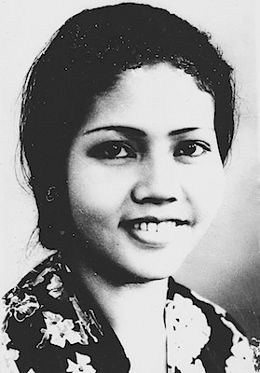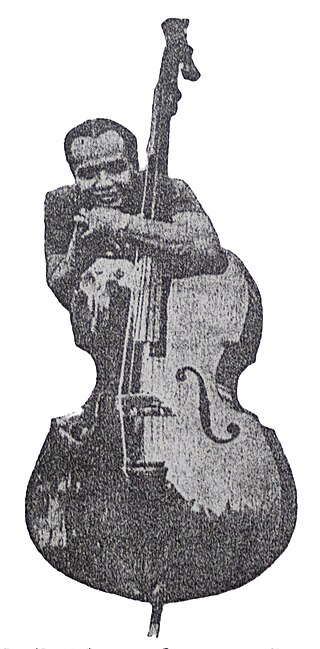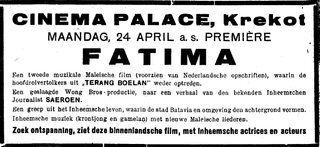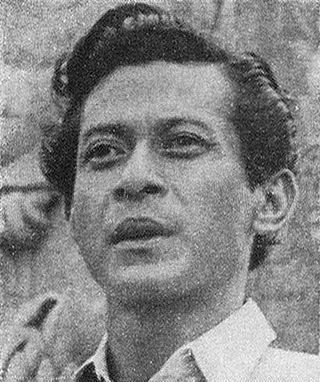
Hajji Raden Mochtar, often credited as Rd Mochtar, was an Indonesian actor. Of noble descent, Mochtar was discovered by Albert Balink and first cast in the commercial failure Pareh (1936). Rising to popularity after the release of Terang Boelan the following year, he spent nearly sixty years in film, while also becoming a businessman and farmer.

Terang Boelan is a 1937 film from the Dutch East Indies. Written by Saeroen, directed by Albert Balink, and starring Rd Mochtar, Roekiah and Eddie T. Effendi, Terang Boelan follows two lovers who elope after one is almost forced to marry an opium smuggler. The film was shot in the Indies and Singapore, and was partially inspired by the 1936 Hollywood film The Jungle Princess. It was aimed at native audiences and included keroncong music, which was popular at the time, and several actors from Balink's previous work Pareh (1936).

Roekiah, often credited as Miss Roekiah, was an Indonesian kroncong singer and actress. The daughter of two stage performers, she began her career at the age of seven; by 1932 she had become well known in Batavia, Dutch East Indies, as a singer and stage actress. Around this time she met Kartolo, whom she married in 1934. The two acted in the 1937 hit film Terang Boelan, in which Roekiah and Rd Mochtar played young lovers.

Raden Mas Kartolo was an Indonesian actor and songwriter. Born in Yogyakarta to a noble family, he entered the theatre and married the actress Roekiah around 1933. The two, living in Batavia acted in numerous movies together, starting with the 1938 hit Terang Boelan. However, Roekiah was always cast with other actors as her romantic interest. After Roekiah died in 1945, Kartolo brought the family to Yogyakarta and worked with Radio Republik Indonesia until his death. One of his sons, Rachmat Kartolo, went on to be an actor in the 1960s and 1970s.

Raden Ariffien, often credited as Rd Ariffien, was an Indonesian film director. Initially a nationalist figure, he entered the film industry in 1940 after a period in theatre and radio. During his 25-year career, he was involved in some 36 films in various positions. He later became head editor of the film magazine Varia.
Berita Film Indonesia was the first government-owned film production company of Indonesia. BFI was formally established on 6 October 1945, after the Japanese occupation army surrendered, using the same equipment and studio as the Japanese studio Nippon Eigasha. The company, under RM Soetarto and Rd Ariffien, was soon forced to leave Jakarta for Surakarta and later Yogyakarta owing to the ongoing revolution against the former Dutch colonists. After the Netherlands recognised Indonesia's independence in December 1949, BFI was merged with the Dutch-owned Regerings Film Bedrijf.

Fatima is a 1938 film from the Dutch East Indies directed by Othniel and Joshua Wong. Written by Saeroen, it starred Roekiah, Rd Mochtar, and ET Effendi and followed two lovers who are disturbed by a rich youth. The film followed the same formula as the earlier hit Terang Boelan, and saw commercial success domestically. It is one of three films which Misbach Yusa Biran credits with reviving the domestic film industry, which had been faltering.

Panggilan Darah is a 1941 film from the Dutch East Indies written and directed by Sutan Usman Karim and produced by Tjho Seng Han for Oriental Film. The black-and-white film starred Dhalia and Soerip as orphaned sisters trying to make a living in the colonial capital of Batavia before moving to Kudus to work at a clove cigarette factory.

Srigala Item is a 1941 film from the Dutch East Indies that was directed by Tan Tjoei Hock and produced by The Teng Chun for Action Film. Starring Hadidjah, Mohamad Mochtar, and Tan Tjeng Bok, the film's plot – inspired by Zorro – follows a young man who became a masked vigilante to take revenge against his conniving uncle. Srigala Item was a commercial success, which Misbach Yusa Biran credits to the plot's use for escapism. A copy of the black-and-white film, which featured kroncong music, is stored at Sinematek Indonesia.

Sorga Ka Toedjoe is a 1940 film from the Dutch East Indies directed by Joshua and Othniel Wong for Tan's Film. It follows an older couple who are reunited by another, younger couple after years of separation. The black-and-white film, the first production by Tan's Film after the departure of Rd Mochtar, featured kroncong music and was targeted at lower-class native audiences. It was a commercial and critical success. Roekiah and Djoemala took leading roles in three more films before Tan's closed in 1942. Sorga Ka Toedjoe is now thought lost.
Djaoeh Dimata is a 1948 film from what is now Indonesia written and directed by Andjar Asmara for the South Pacific Film Corporation (SPFC). Starring Ratna Asmara and Ali Joego, it follows a woman who moves to Jakarta to find work after her husband is blinded in an accident. SPFC's first production, Djaoeh Dimata took two to three months to film and cost almost 130,000 gulden.

Ismail Djoemala was an Indonesian actor active in the 1940s. He was often cast alongside Roekiah as her romantic interest.

Bengawan Solo is a now-lost 1949 film from what is now Indonesia. Directed by Jo An Djan, it starred Sofia WD, Rd Mochtar, and Mohamad Mochtar.
Moestika dari Djemar is a 1941 film from the Dutch East Indies. Multiple modern sources also use the incorrect spelling Moestika dari Djenar, but contemporary sources uses an "m".

Dhalia was an Indonesian actress active for over fifty years. She was nominated for three Citra Awards at the Indonesian Film Festival, winning one.

Si Gomar is a 1941 film from the Dutch East Indies which was written and directed by Tan Tjoei Hock and produced by The Teng Chun. Starring Hadidjah, Mohamad Mochtar, and Tan Tjeng Bok, the movie follows a brother and sister who are separated by robbers and almost marry before their cousin recognises them.

Mohamad Mochtar, usually credited as Moh Mochtar, was an Indonesian film actor active from 1939 until his death in 1981.

Mas Sardi was an Indonesian composer and musician notable for being the country's first professional music supervisor. He and his wife Hadidjah were the parents of Citra Award-winning musician Idris Sardi.

Pantjawarna is a 1941 film from the Dutch East Indies.

Waldemar Caerel Hunter, best known by his stage name S. Waldy, was an Indonesian stage and film actor.